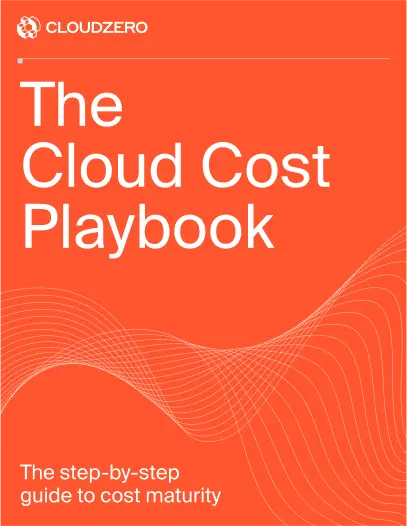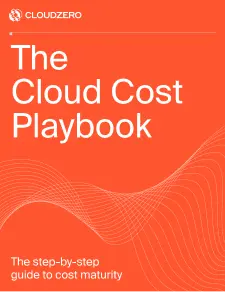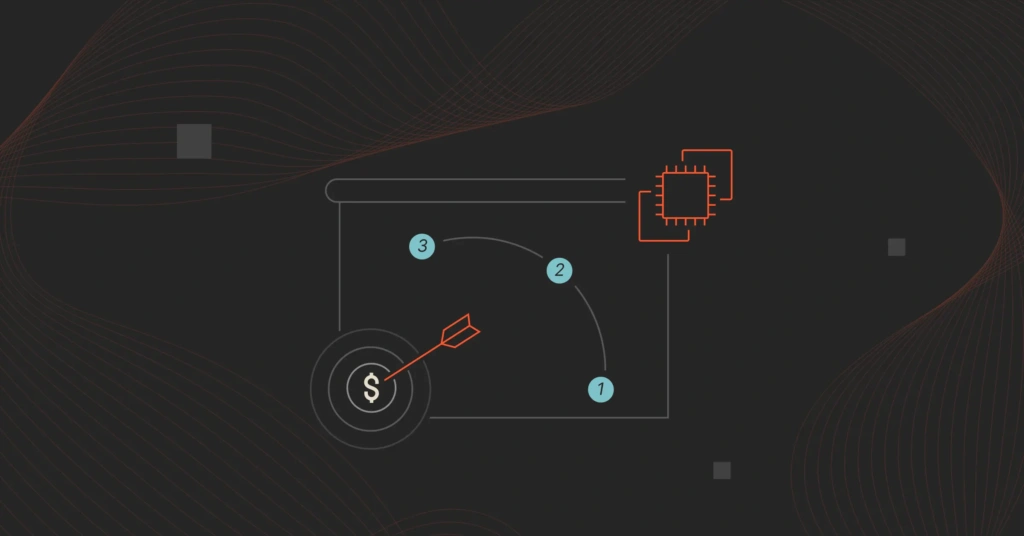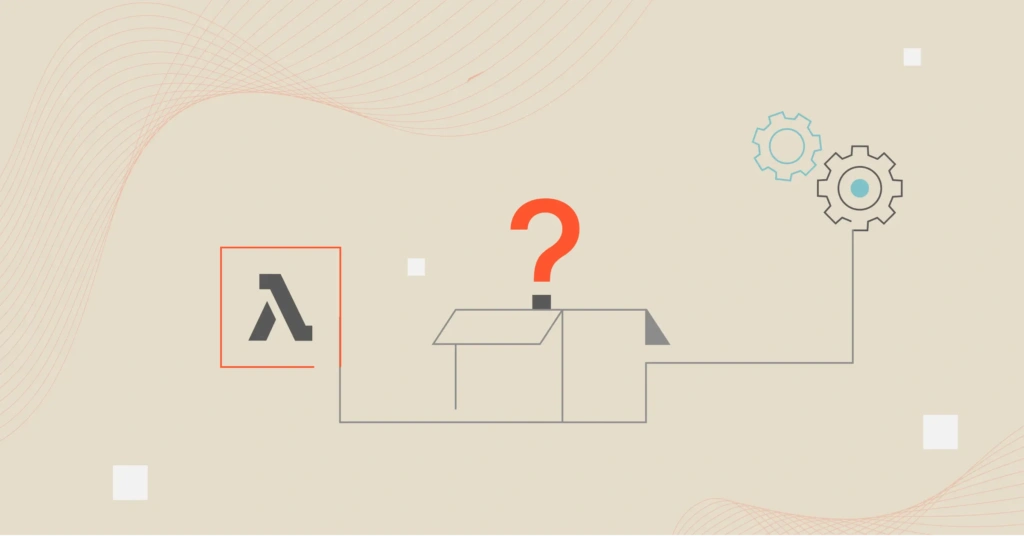As you’ve probably realized by now, cloud computing isn’t the future. It is here and now. According to Gartner, global spending on public cloud services alone will surpass $725 billion by 2024.
This rise in cloud computing is a great career opportunity for you. And what better way to immensely benefit from this shift than becoming a cloud engineer?
If becoming a good cloud engineer is what you want, here’s what you need to know, including info on what a cloud engineer does, salary, career prospects, and more.
What Is Cloud Engineering?
Cloud engineering is the practice of designing, building, and maintaining cloud computing systems. The discipline focuses on ensuring that cloud systems and cloud-based applications are reliable, scalable, and secure.
To achieve this, cloud engineering professionals use a variety of technologies, platforms, and tools to optimize cloud infrastructure. These include virtualization, storage, networking, and cloud security technologies.
Consider this. Gartner reported that 85% of organizations said they would be “cloud-first” by 2025. Additionally, the research firm reported that half of enterprise IT spending with be for cloud-based use cases.
This means cloud engineering jobs will become even more prevalent in the coming years. In fact, cloud engineers are already in high demand, as the demand for cloud computing services continues to grow.
Check this out:
- Indeed, the leading online job listings platform, reported cloud engineering as the third most in-demand career of 2023. From January 2020 to January 2023, there was a 65% increase in cloud engineer jobs.
- CIO ranked “cloud engineer” at the top of its “10 most in-demand tech jobs in 2023” list.
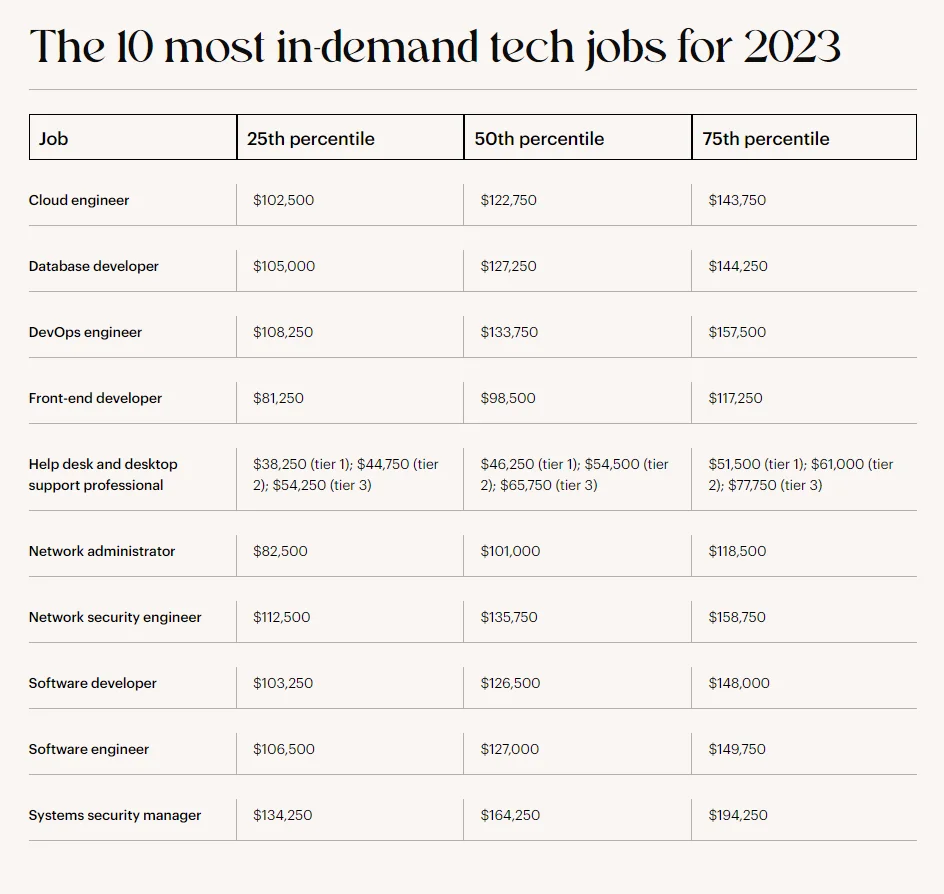
Credit: CIO
So, where do you begin?
Let’s start with a look at what a cloud engineer does on a day-to-day basis.
What Is A Cloud Engineer And What Do They Do?
As a cloud engineer, you are responsible for ensuring your organization delivers or makes the most of cloud computing services. For example, cloud engineers prepare cloud infrastructure for an organization’s applications, implement a cloud computing strategy, and ensure the security of cloud systems.
The main responsibility of a cloud engineer is to ensure that his or her organization takes full advantage of cloud computing.
For example, we often see companies hire cloud engineers to achieve a certain price performance in the cloud, enabling them to maximize their return on investment.
Cloud engineers typically have a background in computer science or engineering. They also have working experience with cloud computing technologies and best practices.
What does a cloud engineer do on a day-to-day basis?
The typical cloud engineer job description will list responsibilities such as:
- Knowledgeable about how different cloud providers work, including Amazon Web Services (AWS), Microsoft Azure, and Google Cloud Platform (GCP).
- Design, prepare, and configure an optimal cloud environment for an organization’s existing applications, services, dependencies, and more.
- Plan and implement migrations to the cloud from an on-premises environment.
- Write scripts to automate and optimize cloud processes.
- Monitor and manage cloud-based systems once migrated to ensure optimal security, performance, and cost efficiency.
- Identify, analyze, and fix bugs in code to prevent service outages or cost overruns.
- Work with developers/Software Engineers, DevOps teams, Product Designers, and other professionals to create effective applications and web experiences.
- Train, recommend, and implement cloud policies for and with employees and customers.
- Identify, analyze, and optimize data security following the Shared Responsibility Model in the Cloud.
- Manage databases, including cloud data platforms such as Snowflake and Databricks, and services such as Amazon RDS or Redshift.
- Update, roll out, and maintain cloud systems in the desired state.
This is a quick, general overview of the role and responsibilities of a cloud engineer. There are different types of cloud engineering roles, as we’ll discuss later.
To give you an idea, cloud architects, cloud security engineers, and cloud system administrators are all involved in cloud engineering.
And now you might be wondering…
What is the difference between a cloud engineer and a software engineer?
A software engineer designs, plans, builds, and delivers software applications and systems to meet a customer’s requirements. Meanwhile, a cloud engineer ensures such applications and systems work as required in a cloud environment.
While a software engineer often writes code to build apps for an on-premises data center, or end user, a cloud engineer focuses on cloud computing solutions.
Cloud engineers often use different automation tools, processes, and technologies to continuously integrate (CI/CD), automate (IaC), and optimize cloud resources and infrastructure components for specific use cases – instead of needing to write stuff from scratch.
Is a cloud engineer different from a DevOps engineer?
DevOps is not a specific engineering discipline. Instead, it is an efficiency-driven, holistic approach to building high-quality solutions in the cloud or on-premises. A cloud engineer can be a DevOps engineer, implementing DevOps best practices in a cloud environment or whatever their specific cloud engineering role.
What is the difference between SREs and cloud engineers?
A Site Reliability Engineering professional applies software engineering expertise to system administration and operations.
An SRE can be a cloud engineer who figures out how to scale a cloud-native system to accommodate more users, features, and use cases without compromising uptime and resilience, as one example. More SREs are learning to help their companies optimize cloud costs, too.
That said, here’s how you can become a good cloud engineer.
How To Become A Cloud Engineer
If you’re interested in becoming a cloud engineer, there are a few things you can do to prepare. First, get a solid foundation in computer science and engineering.
Second, learn about cloud computing technologies and best practices. Third, gain experience working with cloud computing systems. There’s more.
How do I become a cloud engineer with no experience?
Starting from scratch is one option. There are several ways to get experience with cloud computing systems.
You can work on personal projects, volunteer for open-source projects, or get a job as an intern cloud engineer. Once you have some experience, you can start applying for entry-level or more advanced cloud engineering jobs.
What Skills, Certifications, And Other Qualifications Do You Require to Become A Cloud Engineer?
A cloud engineer does not need a degree, but you should have a solid understanding of computer science, cloud infrastructure, and networking systems.
A competent cloud engineering professional will also need to have the following hard skills.
- Practical expertise in cloud computing technologies, such as IaaS, PaaS, and containers (Docker or Kubernetes), and best practices.
- Working knowledge of implementing cloud-based and cloud-native technologies, such as IaC, CI/CD, DBaaS, and more.
- Working knowledge of the major cloud platforms such as AWS, Azure, GCP, and Oracle Cloud and rising providers, such as Alibaba Cloud, DigitalOcean, Vultr, and Kamatera.
- Several programming skills in languages such as Python, Java, and R.
- A solid understanding of DevOps, APIs, and web services.
- Working knowledge of operating systems such as Linux, Ubuntu, and Windows.
- Good understanding of networking concepts, including Internet Protocol (IP), Virtual private network (VPN), Hypertext transfer protocol secure (HTTPS), and Domain name system (DNS).
- Good knowledge of open standards to integrate and manage Open-source programs.
We mentioned you don’t need a degree to get a cloud engineer job. You can instead train with these certifications and programs from some of the top cloud engineering companies.
AWS offers 12 certifications while Azure provides 24. Here are examples.
- AWS Certified Cloud Practitioner if you want to improve your working knowledge of the AWS cloud.
- Microsoft Certified: Azure Fundamentals to understand the basics of how the Microsoft Azure Cloud works.
- AWS Certified SysOps Administrator if you want to serve as system admin for Amazon Web Services or its customers
- Google Associate Cloud Engineer if you want to specialize as a Google Cloud Platform engineer
- Microsoft Azure Fundamentals should you want to become a cloud engineer for Microsoft Azure customers
- AWS Certified Solutions Architect helps you gain expertise on various aspects of the AWS ecosystem
Over 17 cloud engineering certifications, boot camps, and programs can help you get the knowledge you need to get started.
Different Career Paths For Cloud Engineers
Cloud engineering is a growing field with a lot of opportunities. If you’re interested in a career in cloud computing, becoming a cloud engineer is a great way to get started.
What jobs will you get as a cloud engineer?
Here are the different types of cloud engineering jobs you can learn and get hired for. Each role will have a varying cloud engineer job description, of course.
- A cloud architect manages cloud infrastructure components and how they work together. This cloud engineer oversees architecture, configuration, and deployment in cloud environments, including building a roadmap for setting up an organization’s cloud infrastructure.
- A cloud software developer is responsible for building and maintaining cloud-based software features, functions, databases, and applications. Also known as a cloud application developer, this is a software engineer who specializes in building, deploying, and optimizing cloud-based or cloud-native applications.
- A cloud security engineer builds, optimizes, and maintains security components to protect cloud-based platforms, applications, services, etc. An engineer should be familiar with the hardware, software, and compliance requirements of his or her organization’s industry.
- A cloud administrator or cloud admin oversees the software and hardware that run cloud-based applications. System administration, virtualization, and troubleshooting will need to be your strong skills as a cloud admin.
- A cloud network engineer manages the network infrastructure and software that connects clients and service providers. A good network engineer will also have network security skills to protect data in transit.
- A cloud automation engineer specializes in automating cloud processes, using various tools, orchestration methods, and integration technologies. This professional is also responsible for setting up and managing cloud services, as well as troubleshooting any issues that may arise.
A cloud engineering career can also include being a machine learning engineer, a DevOps engineer, or a cloud database management professional. New roles will certainly emerge as the discipline evolves.
In general, these cloud engineering responsibilities overlap in some aspects while maintaining a specialization in others. For example, all cloud engineers need to have a strong understanding of various cloud providers.
Are cloud engineering jobs going to be in-demand in the future?
The cloud engineer job outlook is exciting because cloud computing will continue to grow and evolve.
Despite automation reducing workloads, cloud engineers will still be needed to optimize and maintain cloud infrastructure.
Cloud engineers will also be needed to develop new cloud applications, manage complex cloud environments such as hybrid clouds, as well as troubleshoot and debug existing applications. So, Cloud engineers will be in high demand for the foreseeable future.
What’s The Average Salary For A Cloud Engineer?
The average salary for a cloud engineer is $113,000 per year, according to Glassdoor, which currently has over 30,400 cloud engineer-related jobs.
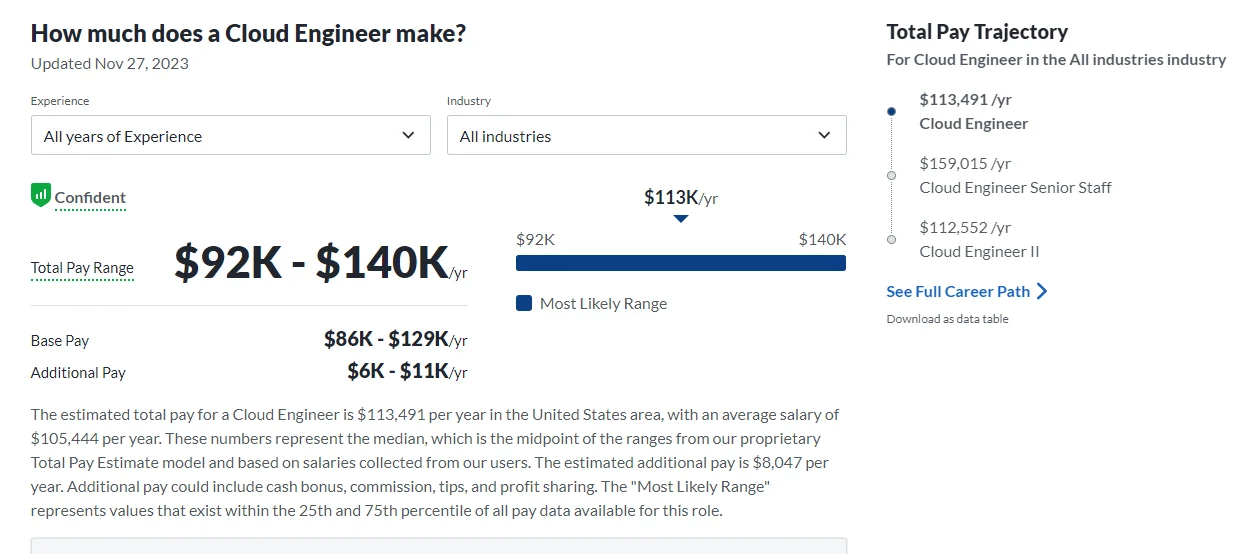
Cloud engineers earn a base salary of $92,000 per year. According to Glassdoor, Cisco, Google, AWS, Oracle, and VMWare are some of the best-paying companies for cloud engineers.
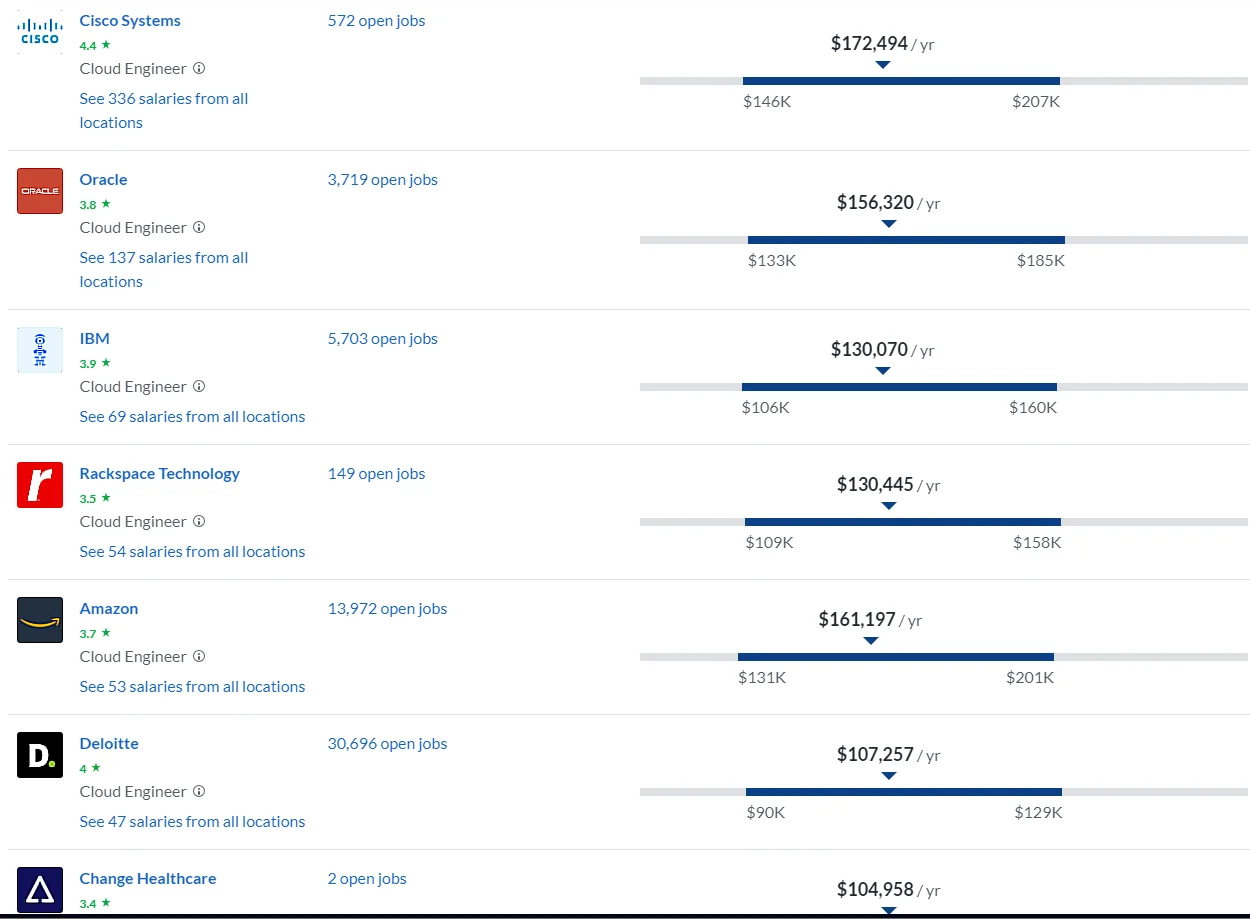
Elsewhere, Indeed reports that the average salary of a US cloud engineer with one or two years of experience is $143,000. At the time of publishing this guide, Indeed reported a total of 54,403 open cloud engineering jobs.
Overall, the salary range varies depending on your experience, skills, location, employer, and industry.
However, the best cloud engineers are the ones who find solutions to challenges. Understanding, controlling, and optimizing cloud costs is the top challenge in cloud computing today – bigger than cloud security.
Want to be the most valuable cloud engineer in the room? Find out how CloudZero helps you keep cloud costs sustainable better than other cloud cost optimization platforms.
Cloud Engineering FAQs
Can you become a cloud engineer without a degree?
A degree isn’t necessary to become a cloud engineer. Instead, you can learn through different certifications, boot camps, programs, internships, volunteer work, and mentorships.
How long does it take to learn cloud engineering?
In cloud engineering, each area will take a different amount of time to learn, as will each certification program. Other trainings are self-paced, so how quickly you finish depends on how much effort you put in.
What is the fastest way to become a cloud engineer?
As a cloud engineer, gaining hands-on experience through volunteer work, internships, and mentorship programs is the fastest way to gain working experience.
How much do cloud engineers get paid?
The average salary for a cloud engineer is $82,000 to $205,000 per year, according to Glassdoor and Indeed. A cloud network architect, for example, earns an average salary of $124,000, according to the US Bureau of Labor Statistics.
Do cloud engineers work from home?
Yes, you can work as a remote cloud engineer, depending on the company you want to work for.
Is cloud engineering a good career?
Typically, cloud engineer jobs offer hands-on experience, well-paying wages, and development opportunities.
